Thru a Zen lens: Another way to look at cancer (Part I & II)
Your Nutritional Moment of Zen
A theory: What to do about it…before, during…and after
It’s worth repeating several times): An ounce of prevention is worth a pound ton of cure
Part 1 – The premise behind this paper
It comes down to this: You can’t expect to go down the right road when you are pointed in the wrong direction.
Just a few days ago fifty years ago
December 23, 1971, then President Nixon signs into law the National Cancer Act which, in effect, launches the official war on cancer. The goal was to find a cure for cancer. The main tools to accomplish this were surgery, radiation, and chemotherapy. They were the big three at the time and they are pretty much the same big three now. Meanwhile, over $100 billion has been spent in the battle.[1] Have we gotten our money’s worth?
Probably not…and why not
Despite the glowing reports from any number of agencies, things really haven’t improved much (with a few exceptions[2]). How could the news we all hear be so much rosier than the reality? There are two big reasons: Lead-time bias and the explosion in testing.
Lead-time bias
The gold standard for cancer survival is 5-years. If one with diagnosed cancer lives that long they are deemed a survivor and a success story – a glowing and powerful statistic proving modern medicine’s efforts are indeed the stuff of turning hopes and dreams into reality, and more so every day.
Lead-time bias is the sobering, bring-you-back-to-earth “real” reality. Basically, what it says is 5-year survival is a relatively meaningless figure. If all we have done is detect a cancer sooner and the patient still dies at the same time as one whose cancer was simply detected later – Have we accomplished anything?
Graphically it looks like this:[3]
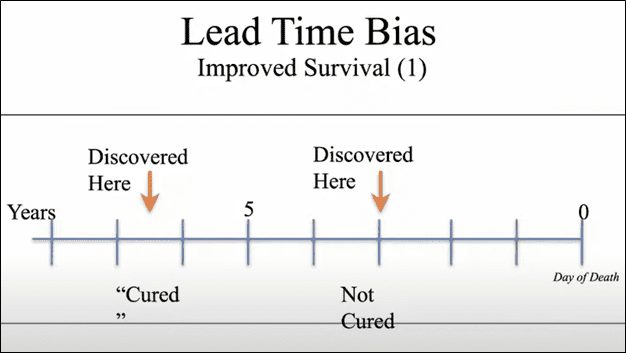
The (very) dark side of increased testing…Overdiagnosis
Similar to lead-time bias, it is more a cancer success “parlor trick” than a meaningful metric showcasing the fruits of billions of dollars of research and our well-intentioned contributions. Basically, what you come up with is a lot more discoveries, but no more survival. If you test for it often enough, sooner or later you will often find something, but the “something” is often not cancer, or at least cancer in the sense of something that will kill you.
What this leads to is many people being deemed cancer victims and their ensuing survival another modern cancer treatment success story. The truth, challenging as it may be, is they were not cancer victims in the first place, and thus they are not proof of today’s treatment protocols (surgery, radiation, chemotherapy) efficacy.
Here, for instance, is what the Cochrane Collaboration had to say about mammography:[4]
If we assume that screening reduces breast cancer mortality by 15% and that overdiagnosis and overtreatment is at 30%, it means that for every 2000 women invited for screening throughout 10 years, one will avoid dying of breast cancer and 10 healthy women, who would not have been diagnosed if there had not been screening, will be treated unnecessarily. Furthermore, more than 200 women will experience important psychological distress including anxiety and uncertainty for years because of false positive findings.
Both in Canada and in Europe cancer screening is becoming more and more “not recommended” or not carte blanche recommended, or at the least, not recommended as frequently.[5] Their general concern is the harms of overdiagnosis (false positives leading to emotional trauma and unnecessary treatment) outweigh the observed benefits of detection.[6]
To be clear, there is one cancer test that is clearly worth its weight in gold: The PAP test for cervical cancer in women. That one is a hands down winner.
The two most valuable things I have learned about cancer
- An ounce of prevention is worth a pound (or more like a ton) of cure:[7]
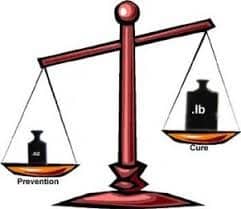
- You can’t cure what you are still causing to create (Applies to virtually all lifestyle diseases, which for the most part, as we will see, cancer is)
Now for the controversial part (Part I) – A theory: What is cancer?
Cancer is the uncontrolled growth of cells without function beyond their own survival and growth. Cells without a soul if you will. They do nothing for the good of the organism as a whole (i.e., us.). To put it in Star Trek: The Next Generation terms – Cancer cells are cells that are not part of the Collective.
Cancer cells have properties and behave in a way that is very primitive. I mean not like 50,000 years ago, but 3.5 billion years ago. They generate their operating energy thru the fermentation of glucose (oxygen not required and actually anathema to the process). These are exactly the conditions on Earth some…3.5 billion years ago.
The process is highly inefficient, as you might expect from something so primordial in nature. Cancer cells generate just two molecules of ATP[8] from every molecule of glucose. For comparison, a “normal” cell utilizing aerobic (with oxygen) metabolism generates 32 molecules of ATP from one molecule of glucose. Just a slight 16 times more efficient…[9]
No wonder cancer cells are such voracious eaters and such excellent generators of new blood vessels (angiogenesis) to fuel their metabolism and growth.
One of the other hallmarks of cancer cells is their uncanny ability to metastasize (easily spread throughout the body). Having no need to stay connected to their brethren and much benefit for the species to be in many different places, you can readily see how this tendency confers a significant survival advantage to the cancer itself.
Now for the controversial part (Part II) – A theory: What causes cancer?
In amongst the research I did for this Zen, I came across two different schools of thought on this question. Neither, for the record, involved genetics as a cancer precipitator. One was DNA damage generating mitochondrial disfunction; and the other was mitochondrial damage generating DNA disfunction. In the spirit of the great debate regarding which came first, the chicken or the egg, in the end I gathered it didn’t matter. From all I can conclude, it may well be some of each causing the other. One way or another, though, both are very involved in the generation of cancer.
Prolonged exposure to any “provocative agent” can precipitate cancer. With examples being radiation, chemicals (carcinogens), some viruses, hypoxia (extended state of low oxygen), excess reactive oxygen species (ROS) and especially chronic inflammation.
“Curious” sidebar: Animal protein – T. Colin Campbell in The China Study (I think) conclusively showed that animal protein in excess of 10% of caloric intake had a strong tendency to precipitate cancer growth:[10]
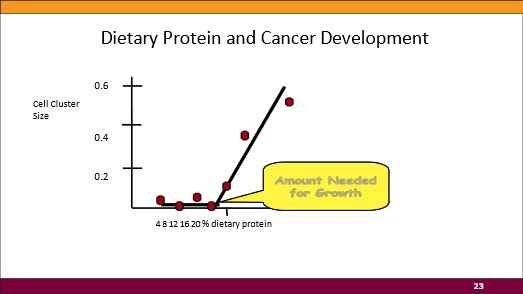
I’ll go out on limb a bit to propose a possible supporting mechanism to this finding: Of the three macronutrients (fats, carbohydrates and proteins), the one that causes the body to go into a defense mode (inflammatory state) is protein, specifically animal protein. Our immune system is charged with two critical sequential functions: Determine if an entering substance is dangerous, and if it is, destroy it before it destroys us. The substance most likely to elicit this investigation is protein…what we are predominantly made of. The immune system must readily separate like from not like. If it is close – attack it. If it isn’t, leave it alone. Animal protein fits the bill on the former; plant protein on the latter…
We tend to think of cancer as a disease of mystery, arriving suddenly, without apparent cause (outside of the obvious ones – tobacco, nuclear radiation, pesticides, etc.) and that different cancers have different causes and characteristics. While each type can manifest uniquely with its own pathogenesis, they do have more in common than not. It is our steadfast belief in the first sentence of this paragraph, and our steadfast denial of the second that gets us into so much trouble when trying to come up with a successful approach that will give us a fighting chance to combat what Siddhartha Mukherjee calls “the emperor of all maladies”.[11]
This is a good place to stop for today. Up next week the “intriguing”, if nothing else, conclusion:
[1] AARP Bulletin Magazine, cover story, November 2021 issue.
[2] Examples where progress has been made: Childhood, blood, and lymphoid cancers, representing fewer than 10% of all cancers. (Source: Dr. John McDougall)
[3] Courtesy of Dr. John McDougall, MD.
[4] https://www.cochrane.org/CD001877/BREASTCA_screening-for-breast-cancer-with-mammography
[5] https://canadiantaskforce.ca/guidelines/published-guidelines/breast-cancer-update/ and…https://healthcare-quality.jrc.ec.europa.eu/european-breast-cancer-guidelines/screening-ages-and-frequencies/women-45-49/summary
[6] One other frightening factor is the testing itself can actually lead to cancer spread. There are two mechanisms: One, when a tumor is biopsied either the needle or the surgery process can cause well-contained and controlled cancer cells to leak into the body-at-large. The other is, in the case of breast cancer screening, the intense squeezing of the breast tissue can cause, once again, well-contained cancerous tumor cells to leak out or escape their containment capsule. Not something you want to happen.
[7] Original quote source: Who else – Benjamin Franklin.
[8] ATP – Adenosine triphosphate – The energy “currency” of all living cells.
[9] In the class I took on Nutrition and Cancer, the figure there was 36 molecules of ATP per glucose molecule. Regardless I think, point made. Fermentation is the pits when it comes to energy production.
[10] Although the graph does not specify it, in the book Campbell is very emphatic this effect only occurs with animal protein, not plant protein.
[11] https://en.wikipedia.org/wiki/The_Emperor_of_All_Maladies
If ever there was a disease that is far better off being prevented than treated, cancer is it.[1] Once it has officially reared its head things are much tougher – Not impossible per se, but clearly fourth down and long yardage type stuff.
While there are exceptions, I’ll quote Hippocrates[2], the widely acknowledged “father of medicine”, for the first of two times in this Zen:
Part 2 – All disease begins in the gut.
Once we realize this, the path to prevention is clear: What we eat gets us in; what we eat can therefore get us out. While it would be wonderful if this simplism was always true, it isn’t. There are “complicating” factors. Two in particular:
- Cancer is a systemic disease 9 times out of 10 by the time it is discovered*
- Cancer takes a long time to rear its ugly head (10 years is typical)
* Once cancer cells have started growing somewhere, it is likely they have spread elsewhere, probably lots of elsewheres. The vast majority of the time this is no big deal. Our bodies are well-equipped to handle this in short order, safely containing them (via capsule / tumor) or simply outright destroying them.[3] The problem comes when we handicap our immune system’s ability to do this. How to prevent that is kind of the purpose of last week’s and this week’s Zen articles…
From Dr. McDougall, once again, a pretty telling diagram:
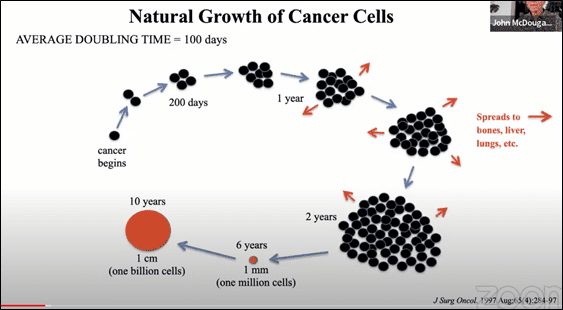
This is why if you can head it off at the pass, so to speak, you are way ahead of the game. How to do that: Diet is #1. It is necessary, but not necessarily sufficient. The diet I am speaking of, of course, is a whole food, plant-based one. There are, however, other lifestyle issues of importance:
- Drink ~64 oz. of water a day (and not much else)
- Sleep to your natural need (for most of us that’s 6 – 8 hrs. per night)
- Exercise regularly (we did not evolve from couch potatoes)
- Get a “sensible” amount of sun and the great outdoors
- Outside of vitamin B12, stay away from vitamin, mineral, etc. supplements
- Go organic where you can, but don’t drive yourself crazy in pursuit of this
- Touchy – feely stuff (corny, but critical)
- Laugh often (or at least smile often)
- Have a social network (we are group creatures by survival design)
- Minimize chronic stress (episodic stress while not fun, we can handle)
If you are not doing any of these, tomorrow would be a good time to start…
Ok, so that’s the “before cancer” part – Now for the “during” part
Diet can be a slow-acting poison and, likewise it can also be a slow-acting healer. The commonality here is “slow-acting”. Sometimes, you don’t have that time. In effect, with cancer one can be in a “live today to fight tomorrow” situation AND that is where the big three of modern medicine have a place (surgery, chemotherapy, radiation). One needs to be aware, though, these are not meant to be forever treatments. What I read from people I give credence to, is to use them for a finite amount of time and then stop. Bring them back if and when the cancer returns. As anyone who has had any of these will testify, they are brutal therapies. There is nothing fun about them.
A great relevant line from T. Colin Campbell (The China Study / The Future of Nutrition):
“How did we come to regard poison as a tool in the pursuit of health?”
How I spent my summer vacation, two summers ago
…and how this ties into our topic. To finish my nutrition degree program, I had to complete a research project. The subject was to examine and comment on sixteen alternative cancer treatments. It took nine weeks, eight hours a day, five days a week…and over 100 pages of writing (typing). My general conclusion – the vast majority of them were nothing more than snake oil in the twentieth / twenty-first century. Their creators / promoters were lucky they weren’t in prison or tarred and feathered in another age.
A few of them, though, did appear to have benefit as adjuncts to an ongoing WFPB protocol and the targeted, temporary / as needed big three:
- Hyperbaric oxygen (recall cancer cells don’t like oxygen)
- Hyperthermia (they don’t like heat either)
- Keto diet (but ONLY for short durations in a medically supervised hospital setting)
A fourth is part of something bigger which we’ll talk about in a minute. But first I would like to sidebar back to the AARP article on the war on cancer I referenced last week in Part I of this two-part Zen. Imbedded in the article was a list of nine things you could do to fight your own war on cancer (with my comments, naturally):
- Quit smoking (Kind of ridiculously obvious, but can’t go wrong with this one)
- Drink less alcohol (McDougall says may not have a direct cause and effect relationship, but good general advice)
- Exercise more (Made my list above, too)
- Drink your milk (No! No! No! Really bad advice. This is the first thing you should give up…right after smoking)
- Drink coffee (I wouldn’t take up the habit to combat cancer, but it’s not a deal-breaker either)
- Drink green tea (Another one hard to argue with. Certainly won’t hurt.)
- Try yoga (Falls into my chronic stress reduction category suggestion)
- Eat vegetables (Specifically cruciferous vegetables[4], but you can’t go wrong with any vegetable.)
- Sleep 7 to 9 hours a night (Also one of my lifestyle to-do suggestions above.)
So overall, outside of the one absolute clunker (milk), not a bad list, but…nowhere do they mention the true heavy-hitter obvious ones to me: consume a WFPB diet, cut out meat, eliminate oil, minimize highly processed foods, and lay low on the fats). Oh well.
Now returning to that something bigger I mentioned above. There is this landmark book on cancer survival:
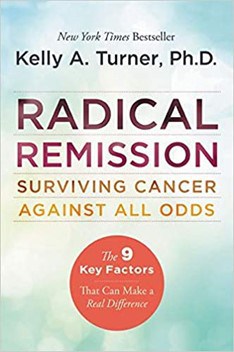
The author investigated and confirmed over 1,000 instances of people who experienced radical cancer remission. She identified 75 different survival strategies. Nine were common to ALL:
- Radically changing diet (Usually to a whole food, plant-based one or close to it)
- Taking control of your health (You become your own case manager, not leaving it to the medical industry)
- Following your intuition (Kind of part and parcel to #2…)
- Using herbs and supplements (Probably faith-based benefit as much as anything)
(Five thru nine are more or less also on my list)
- Releasing suppressed emotions
- Increasing positive emotions
- Embracing social support
- Deepening spiritual connection
- Having strong reasons for living
And lastly, the “after cancer” part
Let’s set the stage with the other quote from Hippocrates:
“Natural forces within us are the true healers of disease.”
When it comes to keeping the cancer wolves at bay, something I said last week bears repeating:
“You can’t cure what you are still causing to create.”
The takeaway from this is simple: If you want to maximize the odds of minimizing the return of cancer, you can’t keep doing or going back to the things that likely played a big part in what got you there in the first place. Hopefully not surprisingly by now, número uno on my list is what you eat, specifically maintaining a whole food, plant-based diet.
To further hammer home the point of all this, the goal is to both weaken cancer and strengthen our immune system so it has a fighting chance. In a fair fight, it will win, and cancer will lose.
Don
“Nutritional Zen Master”
The Wellness Forum Institute
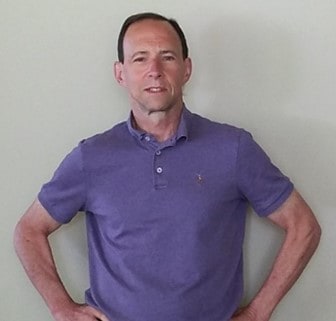
Please review our business at: Google Yelp Facebook
If you’d like to learn more, please visit our Member’s Area to access our subscribed content.
Did you know you can work out and exercise with a trainer at your home, office, hotel room, or anywhere in the world with online personal training?
Like us on Facebook/Connect with us on LinkedIn/Follow us on Twitter
Make sure to forward this to friends and followers!
[1] A T. Colin Campbell quote: “In principle, there are few chronic diseases that are more easily preventable than cancer.”
[2] The guy lived to be about 90, and he did it over 2,000 years ago!
[3] According to Dr. Pam Popper, we have over 100 genes devoted expressly to this task!
[4] Broccoli, Brussels sprouts, cabbage, kale, cauliflower, others. There are over 4,000 of them! The word comes from the cross-like appearance of their flowers. I think lightly steamed is best.
